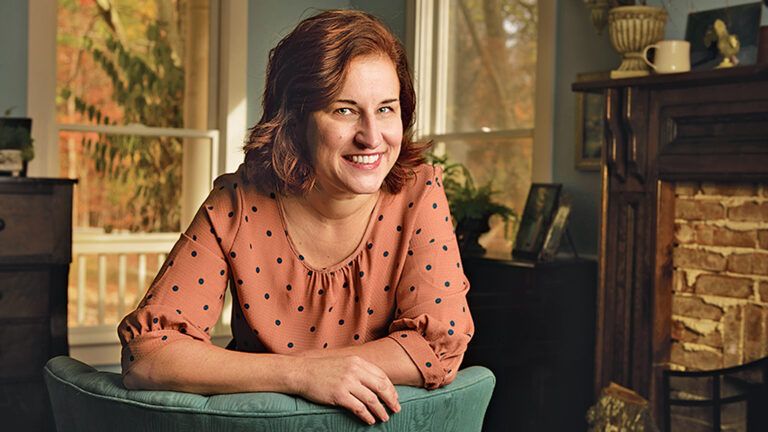You might call my son, Alexander, a Mayberry throwback, as in the old feel-good TV show The Andy Griffith Show. Skinny, sandy-haired and freckle-faced, he even has an old-fashioned look. You’re more likely to find him hunting for tadpoles than playing the latest video game, and he’d rather be walking through the woods than the mall. He rescues injured blue jays and robins and brings them to wildlife rehabilitators. I’ve seen him pry a chipmunk from the jaws of a neighborhood cat and nurse the little creature back to health.
His compassion amazes me. Still, I couldn’t help worrying about him. Alexander seemed so different from the other boys in our suburban Atlanta neighborhood, like he didn’t fit in somehow. I bit my nails in the bleachers at Little League games, watching him chase after bugs instead of balls. I sat anxiously in the church gym, hoping that for once someone would pass him the basketball. I signed him up for theater groups and music lessons, hoping to connect him to his passion, whatever that might be. I prayed, Dear God, please help Alexander find his place in your world. Then I’d go back to searching for just the right extracurricular activity for my son, the one he’d excel in.
Nothing clicked. Until Alexander met the volunteers from Small Dog Rescue in the parking lot of our pet-supply store. He peppered them with questions about dog care and training, and asked about the characteristics of different breeds—the kind of interest I wished he’d shown in his schoolwork.
Although at 10 he was two years shy of the minimum age requirement to volunteer, he won over the director. Alexander went through orientation and training, and soon he was spending four hours every Saturday in front of the store, greeting shoppers and talking to them about the dogs available for adoption. I’d drop him off at noon and when I picked him up in the late afternoon, he would be full of stories about this pup or that.
Sometimes he brought home dogs to foster while they awaited “forever” homes. “They won’t be any trouble, Mom. I promise,” he said. It was true—I never had to remind him to feed, water or walk them. Alexander researched dog care on the internet and checked out every book on dog breeds and behavior the library had. My son had found his passion, all right. I thought my prayers had been answered.
Then one afternoon as soon as I arrived to pick him up, Alexander announced, “Mom, I want to foster Lady. No one else wants her.”
One look at the dog by his side, and I knew why. This wasn’t a teacup poodle or Pomeranian or any of the dainty purebreds that were quickly snatched up. This was a 60-pound mutt, with wiry blond fur and gangly legs. She quivered not with fear, like some abandoned dogs, but with a barely contained energy. The next thing I knew she leapt at me, her paws hitting me square on the chest, knocking me off kilter as she planted a big, slobbery kiss on my face.
“Alexander, I don’t think she’ll fit in at our house,” I said. Much as his four sisters—Alexander’s right in the middle—loved to play with the dogs he brought home, I could imagine they wouldn’t be so excited about this big hyper mutt getting into their things.
“Lady has nowhere to go,” he said. “She’s already been at two homes, and they can’t keep her. Please, Mom, let me foster her. I’ll do all the work.” He looked at me pleadingly.
I relented. “Okay, but remember, she’ll be your responsibility.”
But by then he was already chasing Lady around the parking lot.
Lady was fun, lovable even, but there were plenty of problems. She bounded over our kitchen table, dishes flying in her wake. She had an inexplicable interest in our laundry, especially the towels. She jumped onto the family-room couch and dashed away, a brand-new throw pillow in her teeth.
“Lady, no!” I cried, every time she misbehaved. She cocked her head quizzically, not understanding why I was upset.
Alexander seemed almost as oblivious to Lady’s mischief-making as she was. “Mom, isn’t Lady smart?” he marveled. “She catches on really fast when I’m training her. And whenever there’s something new in the house, she always sniffs it out.”
One day she chomped right through our telephone wires. Alexander sat us all down—my husband, our girls and me—and explained, “Lady only did that because she’s teething. She can’t help it, but I’ll do my best to distract her with toys.” Try telling that to the phone company, I thought.
Every Saturday, Alexander brushed Lady and brought her to adoption day, championing her cause to anyone who walked by. Week after week there were no takers. Yet my son never lost hope. “God, please help Lady find the right home,” I would hear him praying every night before bed.
The months dragged on, and still Lady wasn’t placed with a new owner. I couldn’t bring myself to dash my son’s hopes, but I had to face facts: This dog was unadoptable. If we were going to be stuck with Lady, though, her behavior would have to improve. I confided my dilemma to the director of Small Dog Rescue, and asked if she could recommend a doggy boot camp.
Right away she thought of Mac. He’d started the K-9 unit at the police department in nearby DeKalb County. Now retired, Mac volunteered as a law enforcement consultant, scouting potential police dogs, often at local shelters. I called him and told him about Lady. He agreed to take a look at her. Alexander was thrilled. “This is it, Mom,” he said. “This is what Lady’s been waiting for.” If only I could be so sure.
He put Lady into her crate and we drove to a park where Mac would evaluate her. Alexander sat in the backseat, beside Lady’s crate, unusually quiet.
“You okay?” I asked.
“Just wondering what Mac’s looking for,” he said. Then he brightened and turned to Lady. “You’re gonna do great,” he said. “I just know it.”
Mac shook hands with Alexander. “So, this is Lady,” Mac said, scratching her between the ears. His friendliness put us all at ease. He showed Lady a rolled towel, taped on the outer edges so it looked like a large terry cloth hot dog. He held it above his head. Lady leapt high into the air to snatch it. Then Mac took the towel and hid it behind his back. Lady didn’t hesitate. She circled him and seized it as adroitly as she stole things from my laundry basket.
“This dog has one strong prey drive,” Mac said. For canine law enforcement work, he explained, an instinct to seek prey with single-minded focus is critical. Prey drive, agility, strength, size and a keen sense of smell enable police dogs to perform tasks that no human or machine could match. “Only a few dogs meet the criteria for police work,” Mac said. “Lady’s a natural.”
Alexander practically glowed, he was so proud of Lady. The look on his face said it all: See, I knew she was special!
“If it’s okay with you, Alexander, I’ll take Lady,” Mac said. “I’ll bring her to the police academy and have her tested. My guess is she’ll make a great explosives- or narcotics-sniffing dog.”
Alexander bit his lip and nodded. “Can I say goodbye to her?”
“Of course,” Mac said. “Why don’t you take her over to my truck? She’ll be more comfortable with you leading her.”
Lady walked calmly beside Alexander on her leash. “Sit,” he said, when they got to the truck. Lady sat. Alexander rewarded her with a treat and patted her on the head. “Good girl.” He gave her one last hug. Then it was time to step aside and let Mac put her into the truck.
Alexander and I sat in our car, and watched them drive away. Tears streamed down my son’s cheeks. “I know I did the right thing, but I’ll miss her, Mom,” he said. “I love her.”
“I know, Alexander.” I put my arms around him and hugged him tightly. “And I love you.” As I held my son, my own eyes moistened. I loved his compassion and intelligence, his patience and maturity.
Not that I wouldn’t ever worry about my son again (that’s what moms do), but I knew I didn’t need to. Alexander never stopped believing there was a greater plan for that impossible-to-place dog, long after everyone else had given up. A boy with that kind of faith would discover his own God-given gifts just fine. In fact, I think he already has.



